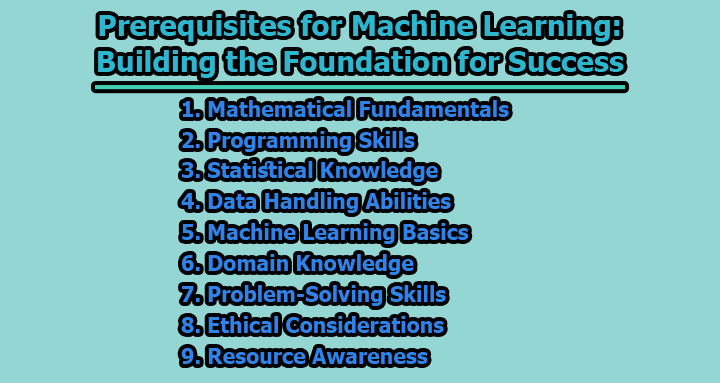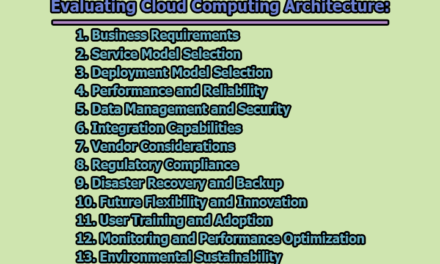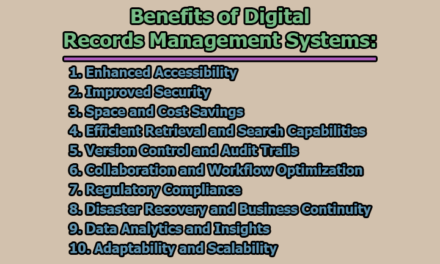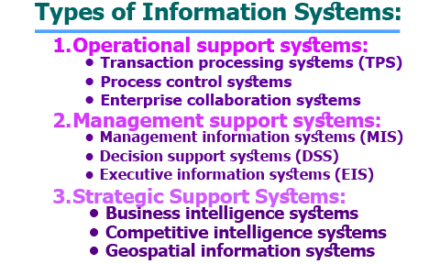Prerequisites for Machine Learning: Building the Foundation for Success
Machine learning has become a transformative technology in recent years, impacting various industries from healthcare and finance to marketing and entertainment. It has the power to extract valuable insights from data, automate tasks, and make predictions. However, delving into the world of machine learning requires a strong foundation in certain prerequisites. In this article, we will explore the essential prerequisites for machine learning, ranging from mathematical fundamentals to coding skills and domain knowledge.
1. Mathematical Fundamentals: Machine learning algorithms are grounded in mathematical principles. To navigate this field effectively, you must have a solid understanding of the following mathematical concepts:
- Linear Algebra: Linear algebra plays a central role in machine learning. You should be comfortable with concepts such as matrices, vectors, matrix operations (addition, multiplication), and linear transformations. These concepts are vital for understanding neural networks, which are at the core of many modern machine-learning models.
- Calculus: Calculus provides the foundation for optimization algorithms used in machine learning. Key topics include derivatives and integrals. You’ll need to understand how gradients and partial derivatives work, as they are essential for training machine learning models through techniques like gradient descent.
- Statistics: Statistics is the backbone of machine learning. You should grasp concepts such as probability, probability distributions (e.g., normal distribution), and statistical measures like mean, median, and standard deviation. Additionally, understand inferential statistics, hypothesis testing, and confidence intervals, as these are essential for model evaluation and decision-making.
2. Programming Skills: The ability to code is fundamental in machine learning. You’ll need to manipulate data, implement algorithms, and build models. Two programming languages are particularly popular in the machine-learning community:
- Python: Python is the de facto language for machine learning. It boasts a rich ecosystem of libraries and frameworks, including NumPy (for numerical operations), pandas (for data manipulation), sci-kit-learn (for machine learning algorithms), and TensorFlow/PyTorch (for deep learning). Learning Python will enable you to leverage these tools effectively.
- R: R is another language commonly used for statistical analysis and data visualization. While Python is more versatile, R’s statistical capabilities make it a valuable choice, especially for researchers and statisticians.
3. Statistical Knowledge: In addition to mathematical concepts, you should have a solid understanding of statistics. Key statistical knowledge areas for machine learning include:
- Probability: Understanding probability theory is essential because machine learning often involves dealing with uncertainty. You should be able to calculate probabilities and work with probability distributions.
- Descriptive Statistics: Master basic statistics like mean, median, mode, and standard deviation. These statistics help you summarize and understand data.
- Inferential Statistics: Learn about hypothesis testing, p-values, confidence intervals, and regression analysis. These concepts are critical for making predictions and drawing meaningful conclusions from data.
4. Data Handling Abilities: Machine learning models are only as good as the data they are trained on. Data preprocessing and cleaning are crucial steps in the machine learning pipeline. Here are some skills and tools you need in this area:
- Data Cleaning: You should be proficient in identifying and handling missing data, outliers, and anomalies. Data quality significantly affects the performance of your models.
- Data Transformation: You’ll often need to transform data, including encoding categorical variables, scaling or normalizing features, and handling imbalanced datasets.
- Data Visualization: Data visualization tools like Matplotlib and Seaborn in Python are essential for exploring data, identifying patterns, and communicating findings effectively.
5. Machine Learning Basics: To get started with machine learning, you need a solid grasp of the foundational concepts:
- Supervised vs. Unsupervised Learning: Understand the fundamental distinction between supervised learning (where the model is trained on labeled data) and unsupervised learning (where the model discovers patterns in unlabeled data).
- Common Algorithms: Familiarize yourself with common machine learning algorithms, such as linear regression, logistic regression, decision trees, k-means clustering, and principal component analysis (PCA).
- Model Evaluation: Learn how to assess the performance of machine learning models using metrics like accuracy, precision, recall, F1-score, and ROC curves. You should also be aware of overfitting and underfitting issues.
6. Domain Knowledge: In addition to technical skills, domain knowledge is often crucial. Depending on your machine learning application, you may need expertise in specific domains like healthcare, finance, natural language processing, or image recognition. Understanding the context in which you are applying machine learning is essential for feature engineering and model selection.
7. Problem-Solving Skills: Machine learning is a dynamic field that involves experimentation and iterative problem-solving. Developing strong problem-solving skills and a systematic approach to tackling machine learning challenges will serve you well. Be prepared to experiment with different algorithms, hyperparameters, and data preprocessing techniques.
8. Ethical Considerations: Machine learning practitioners must be aware of the ethical implications of their work. Bias, fairness, and privacy are important considerations in machine learning. You should understand how biases can emerge in data and models and take steps to mitigate them.
9. Resource Awareness: Stay informed about the latest resources in the field. Online courses, textbooks, tutorials, and academic papers are valuable sources of knowledge. Machine learning is a rapidly evolving field, so the ability to learn independently and adapt to new techniques is essential.
In conclusion, machine learning is a multidisciplinary field that requires a strong foundation in mathematics, programming, statistics, and domain-specific knowledge. By mastering these prerequisites, you’ll be well-equipped to explore the exciting world of machine learning, build predictive models, and extract valuable insights from data. Continuous learning and staying up-to-date with the latest developments are key to success in this dynamic field. Whether you’re a beginner or an experienced practitioner, investing in these prerequisites will undoubtedly enhance your capabilities and open up exciting opportunities in the world of machine learning.

Library Lecturer at Nurul Amin Degree College










